On its surface, the process of educating our children appears to be fairly straightforward. First, you must determine what kind of person you want to produce at the end of their formal schooling. In other words, decide what it means to be an educated person. Then, you establish what knowledge and attitudes will accomplish this goal. Next, hire an administrator who has the ability to pull together all the necessary components; someone who knows the best, scientifically verified, teaching techniques and the best optimum environment for implementation. Finally, give the principal or headmaster the authority to hire gifted teachers who can successfully do the job or to fire teachers who cannot. There’s only one problem with this simple formula: educators disagree on how to complete every one of these steps. To make matters worse, education is one of the most expensive responsibilities that our government fulfills.
In the last forty years, spending in the U.S. on K–12 education has more than doubled. In 1970 it was $221 billion; by 2008 it rose to $556 billion in constant dollars.{1} During that forty year period, enrollment has changed very little, rising from about fifty–one million to fifty–three million students. So essentially, spending today is twice the amount we spent in 1970 on about the same number of students. Naturally, one would expect to see significant gains in learning for that money. However according to the National Assessment of Educational Progress Scores, not much has changed. For the last forty years scores have remained flat. Reading scores for seventeen–year–olds have remained at 285 out of 500, and mathematics scores went from 300 to 306, a minor improvement.{2}
Many argue that the reason we are not making progress in our schools is that we are using the wrong playbook. Because our educational leaders have bought into a philosophy of education based on a faulty view of human nature, they have endorsed techniques in the classroom that have marginal impact at best. This situation has not gone on without being contested. Historians of education point to a struggle going back to the beginning of the twentieth century between two factions that have very different ideas about what it means to be human and what the goal of education should be. Most Americans would be surprised to learn that there has been a century–long struggle between two distinct ways of thinking about how to educate our children.
In what follows we will look at the opposing worldviews of these two education camps and consider how their struggles have impacted our children. Join us as we look at the effect of what might be called the Hundred Years War in American education.
Progressive Orthodoxy
Education historian Diane Ravitch argues that at the end of the nineteenth century, America was facing two possible educational paths. One path led to an academic curriculum consisting of history, literature, science and mathematics, language, and the arts for all high school students. The other path endorsed a vocational emphasis for most, and an academic training only for a few.
Criticism of the academic curriculum came from pragmatic business leaders and faculty members of our newly formed colleges of education that had recently sprung up across the nation. These so–called “progressive” educators felt that schools should be focused on the needs of society and students rather than centered on the traditional content of an academic curriculum. This emphasis on making school more practical and student–centered reflects the thoughts and writings of Jean Jacques Rousseau. Rousseau is considered by many to be one of the most influential thinkers on educational philosophy in Western culture. His book Emile, written in 1762, offered an extremely child–centered educational method in response to the traditional content–focused curriculum of the day.
Rousseau’s educational methods sprung from his faith in a particular worldview. One critical aspect of this worldview is that Rousseau believed that humans are “good” and that they naturally worship their Creator.{3} He also argued that all we need to know about God can be learned from nature; any other source, including the Bible, would be seeking man’s opinion and authority which always turns out to be destructive. Rousseau thanked God for making him free, good, and happy like God himself.{4} Regarding education, it’s not surprising that Rousseau valued freedom above all else. He wrote, “The truly free man wants only what he can do and does what he pleases. That is my fundamental maxim. It need only be applied to childhood for the rules of education to flow from it.”{5}
The result of Rousseau’s worldview is predictable. The child, rather than his teacher, knows best how to learn and what to learn. This student–centered approach leads Rousseau to a strong opinion about books and reading. He brags that, “At twelve, Emile will hardly know what a book is.” He adds, “I hate books, they only teach one to talk about what one does not know.”{6} His Emile will learn from life itself but only when the need for such learning comes from within.
For Rousseau, natural man is always superior to civil man and love of oneself is always good. This focus on freedom and student centered learning would influence educators for centuries and would find a warm reception in the minds of American educators in the progressive education movement.
Rousseau’s Disciples
It’s ironic that the most prestigious college of education in America, Teachers College at Columbia University, began as the Kitchen Garden Association in 1880 with the goal of training young girls to work as cooks and housemaids. Later, carpentry was added to attract boys and, as a result, the name was changed to the Industrial Education Association. In 1887 it was renamed the New York College for the Training of Teachers, and five years later just Teachers College. The opening of Teachers College marked the birth of the progressive education movement in America.
If Teachers College was the birthplace of progressive education, John Dewey was its father. Dewey was probably the most influential of all American philosophers and had an immense effect on how we think about education as a nation. He saw schools as a tool for social reform, and the goal of this reform was to replace Christianity with a new secular religion of democracy. To accomplish this goal, schools should turn from the traditional curriculum that encouraged abstract thinking and handing down the best ideas of Western Civilization, and instead base their activities on the needs and experiences of children in the home and community. Children should study problems and processes that mean something to them. Shop work, sewing, and cooking were a greater need than ancient languages, mathematics, history, or theology. As a result, books were downplayed and projects centering on vocational training become the mainstay of many public schools.
While Dewey saw the value of maintaining some of the traditional academic content, some of his disciples worked to have it removed completely. William Heard Kilpatrick took the mantle of leadership for the progressive education movement from Dewey as an immensely popular professor at Teachers College. His 1925 book Foundations of Method described an educational philosophy that, to this day, still controls much of American education. It argued that we should simply teach children—to be child–centered, not subject–centered—because knowledge is changing so quickly and today’s subjects will be of no use tomorrow. It celebrated whole–language over phonics and critical thinking over rote learning, tests, and even report cards. His first opportunity to design an experimental class resulted in no set curriculum, no assigned reading, math or spelling work, and no tests.
Augustine and the Academic Tradition
For the last hundred years, the progressive education movement has promoted a child–centered curriculum as a necessary remedy against a dying books–and–content–centered form of schooling. This old order was often referred to as a “liberal education” or possibly the “academic tradition.” Which worldview undergirds this academic tradition in schooling?
Progressives and traditionalists have very different views of human nature. Rousseau and the progressives argue that humans are created happy, free, and good while traditionalists see things more like the fourth century Christian Augustine of Hippo. Augustine believed that all humans are born with a sin nature and a tendency to do evil. There is a famous passage in his Confessions in which he describes an incident in his youth where he and his friends stole and destroyed fruit from a nearby orchard because, as he writes, “I became evil for no reason. The only motive I had for this wickedness was the wickedness itself. It was disgusting, but I loved it.”{7}
Augustine believed that wisdom did not come from within our fallen natures, but came from God and knowledge of his word. He argued that “we should be led by the fear of God to seek the knowledge of His will . . . it is necessary to have our hearts subdued by piety, and not run in the face of Holy Scripture.”{8} While Augustine depended on God as a source for wisdom, he acknowledged that teachers need to use good methods if they are going to shape the minds and hearts of their students. He asked the rhetorical question, Should the wicked “tell their falsehoods briefly, clearly and plausibly, while the latter [believers] tell the truth in such a way that it is tedious to listen to, hard to understand, and . . . not easy to believe it?”{9}
Augustine and those who followed in his tradition down though the centuries believed that children must be trained in the beliefs and disciplines that made for a civilized society. Not just any information or content would do. A truly educated person would receive a foundation of theological training that would inform all the other disciplines. The first universities in the eleventh and twelfth centuries continued to see theology as the queen of the sciences. Although theology was still center stage through the Renaissance and the Reformation, it was removed from its throne during the Enlightenment in the seventeenth and eighteenth centuries.
The progressive education movement’s efforts to reduce the influence of Christianity on schooling in America have been successful. During the 1960s and 70s the Supreme Court issued ruling after ruling that resulted in the secularization of our public schools. Parents would have to look elsewhere to have their children instructed in a Christian environment.
Why Does This Matter?
Even the progressive education leader John Dewey understood the need to transmit the best of one’s culture to the next generation through the process of education. He wrote, “Unless pains are taken to see that genuine and thorough transmission takes place, the most civilized group will relapse into barbarism and then into savagery.”{10} Dewey and his disciples planned to use this transmission process to change our culture dramatically.
Dewey’s goal was to change the worldview upon which educational philosophy in America was grounded. He was convinced that the only intellectually responsible philosophy was a naturalistic one. This meant that education, ethics, politics, and life itself should be devoid of any hope in, or influence from, supernatural beliefs. As a result, he worked to replace America’s faith in Christianity with faith in democracy, which he referred to as a religious belief. Revelation and religious authority would be replaced with the scientific method and this new faith in democracy.
Dewey was instrumental in breaking the connection to our past as a society. His followers took his lead, offering an even more radical break from the academic tradition. For instance William Heard Kilpatrick, a mathematician, argued that mathematics is “harmful” for ordinary living, and that dancing, dramatics, and doll playing offered more potential for educational growth.{11}
At the end of WWII, progressive ideology reigned supreme in American education. But even though the battle over educational philosophy had been won, its implementation would constantly be challenged. The Russian satellite Sputnik in the 1950s caused a temporary panic and a short lived re–emphasis on science and mathematics. But by then, the enrollment in science had already declined precipitously. For instance, fewer than five percent of high school students took physics in 1955, down from nearly twenty percent in 1900.{12}
By the late sixties, only the lucky few who scored well on IQ tests received an academic high school curriculum, and our universities had begun to give in to student demands for relevancy by gutting the required curriculum and adding less challenging, highly politicized programs like women’s studies, Black studies, and peace studies. To some, it appeared as if adult supervision had disappeared from our university campuses.
In recent decades, parents have resorted to homeschooling and private schools in search of rigorous academics for their children. Others have pushed for charter schools and voucher programs to re–inject greater rigor in the public schools. But it appears that the hundred years war over educational philosophy will continue well into the future.
Notes
1. U.S. Department of Commerce Bureau of Economic Analysis, www.bea.gov.
2. NAEP Data Explorer, National Center for Education Statistics, U.S. Department of Eduation Institute of Education Sciences, nces.ed.gov/nationsreportcard/naepdata.
3. Jean-Jacques Rousseau, Emile or On Education, trans. Alan Bloom (Basic Books, 1979), 278.
4. Ibid., 281.
5. Ibid., 84.
6. Ibid., 116.
7. Augustine, Confessions 2.4.9.
8. D. Bruce Lockerbie, A Passion For Learning (Moody Press, 1994), 78.
9. Ibid., 80.
10. E. D. Hirsch, The Schools We Need, 120.
11. Diane Ravitch, Left Back (Simon & Schuster, 2000), 181.
12. Ibid., 350.
© 2010 Probe Ministries

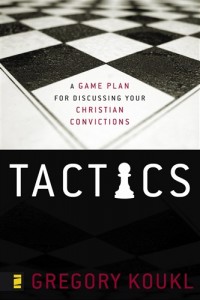
 Actually, our invitation to Romania came about during our first trip to Hungary in 2008. Deanne and I became friends with students Alin and Iuliana Muntean and their 4–year–old daughter, Ruthie. Alin and Iuliana were mature beyond their years, serious students, and active evangelists in the various WOL outreaches. When we let them know that we were returning to Hungary this year, they invited us to Romania to teach as well! WOL Bible Training and Discipleship Center is only two years old but already has fourteen students. Needless to say, we were thrilled to accept their invitation.
Actually, our invitation to Romania came about during our first trip to Hungary in 2008. Deanne and I became friends with students Alin and Iuliana Muntean and their 4–year–old daughter, Ruthie. Alin and Iuliana were mature beyond their years, serious students, and active evangelists in the various WOL outreaches. When we let them know that we were returning to Hungary this year, they invited us to Romania to teach as well! WOL Bible Training and Discipleship Center is only two years old but already has fourteen students. Needless to say, we were thrilled to accept their invitation. Our four–day stay in Romania was a busy one. My class was made up of seven second–year students. I taught five hours a day on Apologetics and Worldviews as well as a one hour chapel that challenged our very capable translator, Wanna. She had an amazing ability to translate difficult abstract ideas from English into Romanian. Her skills became evident as the students asked pertinent questions that demonstrated their grasp of the topics. They were eager to receive the apologetics information on the reliability of the Bible, the deity of Christ, answers to the problem of evil and other topics. I also spent one evening helping them to think through a response to the local Jehovah’s Witnesses whom most had encountered. It was a lively discussion particularly when they realized they now have biblical answers to those false claims. Deanne sat in on the classes to interact with the students too. She prayed with the girls during a devotion and is continuing friendships with them via email.
Our four–day stay in Romania was a busy one. My class was made up of seven second–year students. I taught five hours a day on Apologetics and Worldviews as well as a one hour chapel that challenged our very capable translator, Wanna. She had an amazing ability to translate difficult abstract ideas from English into Romanian. Her skills became evident as the students asked pertinent questions that demonstrated their grasp of the topics. They were eager to receive the apologetics information on the reliability of the Bible, the deity of Christ, answers to the problem of evil and other topics. I also spent one evening helping them to think through a response to the local Jehovah’s Witnesses whom most had encountered. It was a lively discussion particularly when they realized they now have biblical answers to those false claims. Deanne sat in on the classes to interact with the students too. She prayed with the girls during a devotion and is continuing friendships with them via email.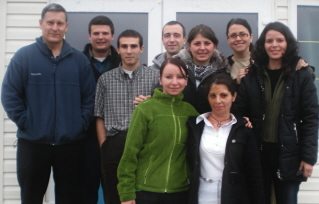
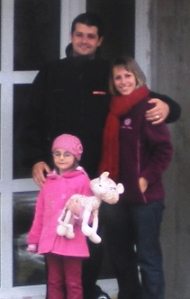

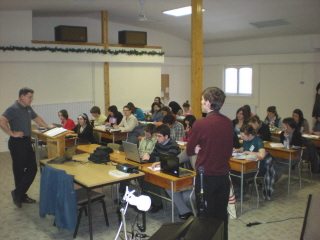 Our time in Hungary was also extremely rewarding. I had thirty students from nine different countries for a course on the cults covering the Mormons, Jehovah’s Witnesses, Scientology, Kabala, the Unification Church, and others. Thanks to the expertise of our translator Chris, the students seemed to enjoy the class and always had great questions. In an hour–long chapel I offered a response to the accusations by the so–called “New Atheists” that there is not enough evidence for God’s existence and that religion is the major source of wars in the world. I could tell that this information was new to the students. Afterwards, one student asked if he could meet with me. We ended up discussing for hours a variety of topics over two separate days. Since his list of questions about the Bible and Christianity was long, I agreed to work through the ones we didn’t cover and email my replies to him. It was encouraging to me that this young man is serious enough about his faith that he wants answers to important questions.
Our time in Hungary was also extremely rewarding. I had thirty students from nine different countries for a course on the cults covering the Mormons, Jehovah’s Witnesses, Scientology, Kabala, the Unification Church, and others. Thanks to the expertise of our translator Chris, the students seemed to enjoy the class and always had great questions. In an hour–long chapel I offered a response to the accusations by the so–called “New Atheists” that there is not enough evidence for God’s existence and that religion is the major source of wars in the world. I could tell that this information was new to the students. Afterwards, one student asked if he could meet with me. We ended up discussing for hours a variety of topics over two separate days. Since his list of questions about the Bible and Christianity was long, I agreed to work through the ones we didn’t cover and email my replies to him. It was encouraging to me that this young man is serious enough about his faith that he wants answers to important questions. The WOL ministry in Hungary is having a significant impact both in the Bible Institute and with evangelistic teams. While we were there, a team was invited to present a drama in Czech schools. Eleven boys met with one of the WOL staff members to talk about Christ after seeing the play, “Born to a Living Hope.” WOL is very serious about evangelism and has effective tools to share Christ in schools, prisons, and in open–air settings. The ministry also has ambitious plans for the 100–year–old historic structure on their property. They have just rebuilt the roof of the building and hope to build new classroom and office space on the third floor.
The WOL ministry in Hungary is having a significant impact both in the Bible Institute and with evangelistic teams. While we were there, a team was invited to present a drama in Czech schools. Eleven boys met with one of the WOL staff members to talk about Christ after seeing the play, “Born to a Living Hope.” WOL is very serious about evangelism and has effective tools to share Christ in schools, prisons, and in open–air settings. The ministry also has ambitious plans for the 100–year–old historic structure on their property. They have just rebuilt the roof of the building and hope to build new classroom and office space on the third floor.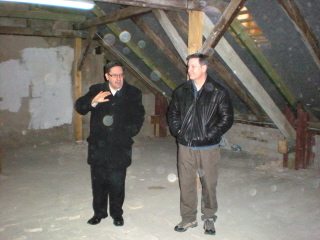

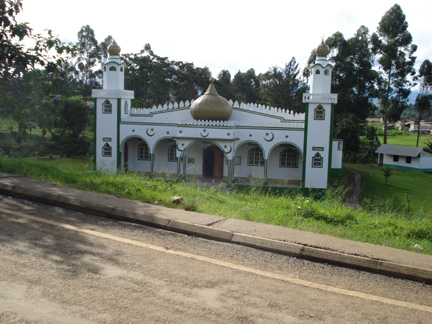 It turns out that the group of pastors in Fort Portal was especially passionate about the apologetics material Pat and I covered during the six hours each day. They were experiencing a direct challenge from Islam and had little information with which to respond. Many of them felt the burden to defend their faith from the rising influx of money and mosques from Libya. Libya’s ruler Muammar Kaddafi has taken an interest in Uganda. In Fort Portal he has built a large, gold-domed mosque and a mansion for the local fifteen-year-old tribal king. Local Muslims have been targeting pastors and their sons by offering money and even cars to those who would convert to Islam. Sadly, some have done so.
It turns out that the group of pastors in Fort Portal was especially passionate about the apologetics material Pat and I covered during the six hours each day. They were experiencing a direct challenge from Islam and had little information with which to respond. Many of them felt the burden to defend their faith from the rising influx of money and mosques from Libya. Libya’s ruler Muammar Kaddafi has taken an interest in Uganda. In Fort Portal he has built a large, gold-domed mosque and a mansion for the local fifteen-year-old tribal king. Local Muslims have been targeting pastors and their sons by offering money and even cars to those who would convert to Islam. Sadly, some have done so.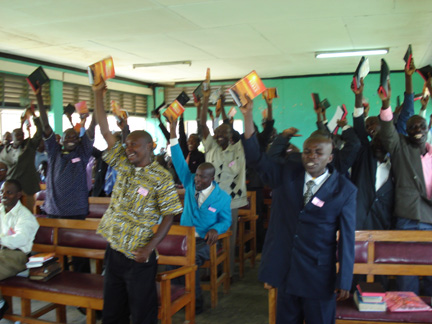 With that, they began celebrating by raising their new Bibles above their heads, dancing and singing a song titled, “Heaven and earth will pass away but God’s Word will endure forever.” It was a very moving for us to see the joy in their hearts because of our teaching.
With that, they began celebrating by raising their new Bibles above their heads, dancing and singing a song titled, “Heaven and earth will pass away but God’s Word will endure forever.” It was a very moving for us to see the joy in their hearts because of our teaching.